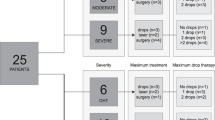Abstract
Background
Glaucoma referrals continue to impart a significant burden on Hospital Eye Services (HES), with a large proportion of these false positives.
Aims
To evaluate the Portsmouth glaucoma scheme, utilising virtual clinics, digital technology, and community optometrists to streamline glaucoma referrals.
Method
The stages of the patient trail were mapped and, at each step of the process, 100 consecutive patient decisions were identified. The diagnostic outcomes of 50 consecutive patients referred from the refinement scheme to the HES were identified.
Results
A total of 76% of ‘glaucoma’ referrals were suitable for the refinement scheme. Overall, 94% of disc images were gradeable in the virtual clinic. In all, 11% of patients ‘attending’ the virtual clinic were accepted into HES, with 89% being discharged for community follow-up. Of referrals accepted into HES, the positive predictive value (glaucoma/ocular hypertension/suspect) was 0.78 vs 0.37 in the predating ‘unrefined’ scheme (95% CI 0.65–0.87). The scheme has released 1400 clinic slots/year for HES, and has produced a £244 200/year cost saving for Portsmouth Hospitals’ Trust.
Conclusion
The refinement scheme is streamlining referrals and increasing the positive predictive rate in the diagnosis of glaucoma, glaucoma suspect or ocular hypertension. This consultant-led practice-based commissioning scheme, if adopted widely, is likely to incur a significant cost saving while maintaining high quality of care within the NHS.
Similar content being viewed by others
Log in or create a free account to read this content
Gain free access to this article, as well as selected content from this journal and more on nature.com
or
References
National Institute of Clinical Excellence. Glaucoma – diagnosis and management of glaucoma and ocular hypertension. 2009.
Vernon SA, Hillman JG, MacNab HK, Bacon P, van der Hoek J, Vernon OK et al. Community optometrist referral of those aged 65 and over for raised IOP post-NICE: AOP guidance versus joint college guidance—an epidemiological model using BEAP. Br J Ophthalmol 2011; 95 (11): 1534–1536.
Morley AMS, Murdoch I . The future of glaucoma clinics. BJO 2006; 90: 640–645.
Lockwood AJ, Kirwan JF, Ashleigh Z . Optometrists referrals for glaucoma assessment: a prospective survey of clinical data and outcomes. Eye 2010; 24 (9): 1515–1519.
Department of Health, United Kingdom Government. http://www.institute.nhs.uk.
Bourne RR, French KA, Chang L, Borman AD, Hingorani M, Newsom WD . Can a community optometrists based referral scheme reduce false-positive glaucoma hospital referrals without compromising quality of care? The community and hospital allied network glaucoma evaluation scheme (CHANGES). Eye 2010; 24 (5): 881–887.
Guidance on the referral of Glaucoma suspects by community optometrists issued by the College of Optometrists and the Royal College of Ophthalmologists, December 2009.
College of Optometrists, Code of Ethics and Guidelines for Professional Conduct, Section D3 Examining patients at risk from glaucoma, April 2010.
Ang GS, Ng WS, Azuara-Blanco A . The influence of the new general ophthalmic services (GOS) contract in optometrist referrals for glaucoma in Scotland. Eye 2009; 23 (2): 351–355.
Henson DB, Spencer AF, Harper R, Cadman EJ . Community refinement of glaucoma referrals. Eye 2003; 17 (1): 21–26.
Vernon SA, Ghosh G . Do locally agreed guidelines for optometrists concerning the referral of glaucoma suspects influence referral practice? Eye 2001; 15: 458–463.
Devarajan N, Williams GS, Hopes M, O’Sullivan D, Jones D . The Carmarthenshire Glaucoma Referral Refinement Scheme, a safe and efficient screening service. Eye 2011; 25 (1): 43–49.
Taylor RH . The bow wave of doom – a preliminary report of the outpatient model. Eye News 2002; 2: 2–5.
National Patient Safety Agency. Preventing delay to follow up for patients with glaucoma. NRLS 0959 2009.
The Health and Social Care Bill, Department of Health, UK Government, January 2011.
Acknowledgements
Julie-Anne Page and Michele Hewlett, Department Managers, Ophthalmology department, Queen Alexandra Hospital, Cosham, Portsmouth, PO6 3LY.
The authors have contributed equally to this publication.
Author information
Authors and Affiliations
Corresponding author
Ethics declarations
Competing interests
The authors declare no conflict of interest.
Additional information
This work has been presented at the Evidence 2011 International Conference, October 2011, London, UK.
Rights and permissions
About this article
Cite this article
Trikha, S., Macgregor, C., Jeffery, M. et al. The Portsmouth-based glaucoma refinement scheme: a role for virtual clinics in the future?. Eye 26, 1288–1294 (2012). https://doi.org/10.1038/eye.2012.120
Received:
Accepted:
Published:
Issue date:
DOI: https://doi.org/10.1038/eye.2012.120
Keywords
This article is cited by
-
Providing capacity in glaucoma care using trained and accredited optometrists: A qualitative evaluation
Eye (2023)
-
Glaucoma triage system: results of implementing a virtual clinic
Graefe's Archive for Clinical and Experimental Ophthalmology (2023)
-
The impact of digitisation of a virtual fracture clinic on referral quality, outcomes and assessment times
European Journal of Trauma and Emergency Surgery (2022)
-
Audit of outcomes following attendance at the City West drive-through IOP glaucoma clinic during the COVID-19 pandemic
Irish Journal of Medical Science (1971 -) (2022)
-
Project Panopia: cost-effective model for glaucoma referral refinement from community optometrists without the need for repeat testing
Eye (2021)



